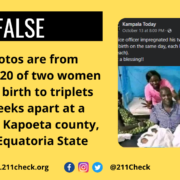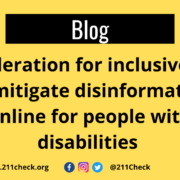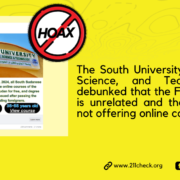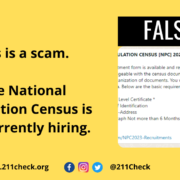Fact-check: Do these tablets contain phenylpropanolamine, as claimed?
No, the tablets mentioned do not contain PPA. It is a compound that was banned years ago.
Writer: Ochaya Jackson
A widely forwarded WhatsApp message warning people about different tablets because they contain ‘Phenyl Propanol-Amide, PPA’, which supposedly causes strokes, is false.
“Avoid these tablets; they are very dangerous: D-cold, Vicks Action-500, Actified, Coldarin, Cosome, Nice, Nimulid, and Cetrizet-D. They contain phenyl Propanol-Amide, PPA, which causes strokes and is banned in the USA,” reads the WhatsApp message.
“Please, before deleting, help your friends by passing it. It might help someone. Forward to as many as you can,” it added.
Screenshot of the WhatsApp message claim forwarded widely in the groups
The same claim can also be traced to a post by a Facebook user in 2017.
Investigation and Research
A keyword search on Google using the words “Does D-cold contain Phenyl Propanol-Amide” returned many results that show the claim is an old issue that has been fact-checked before. The report also stated that “Phenyl Propanol-Amide, PPA” is not correct; instead, the compound is called “PhenylPropanolamine, PPA.”
In addition to that, the search results returned a statement issued by the United States Food and Drug Administration (FDA) in 2005 that ordered phenylpropanolamine, or PPA, to be removed from drug products and requested drug companies stop selling products with phenylpropanolamine.
The FDA, further in the statement, recommended that consumers not use any drug containing PPA and urged them to read drug labels to see if the product has PPA instead of relying on outdated lists of products that may have already been reformulated and no longer contain PPA.
In the same search results, in 2017, the Ayup website published a report about the claim, which confirmed that PPA was no longer in the U.S. markets, citing the risk of stroke in younger women.
The composition of the claimed tablets
Several queries on the Google search engine for each of the claimed tablets found product information associated with the tablets.
According to Apollo Pharmacy – India, D-Cold is formulated to provide relief related to cold symptoms such as blocked noses, headaches, body pain, and sore throats, and its ingredients include paracetamol (500 mg), caffeine (32 mg), and phenylephrine (10 mg).
Vicks Action-500’s package composition includes paracetamol I.P. 500 mg, – Diphenhydramine HCl I.P. 25 mg, phenylephrine HCl I.P. 5 mg, and caffeine (anhydrous) I.P. 30 mg.
The Actifed tablet contains active ingredients called phenylephrine hydrochloride, and the cosome is mainly a combination of chlorpheniramine (antihistamine), phenylephrine (decongestant), and dextromethorphan (cough suppressant).
Both Nise and Nimulid are used to relieve pain and fever, and all of them contain Nimesulide. On the other hand, Cetrizet-D contains cetirizine hydrochloride and pseudoephedrine hydrochloride.
211Check inquired via email to the Swiss Institute of Therapeutic Products if phenylpropanolamine is still being formulated in human medicine, but it said it has been banned for twenty years in Switzerland.
“Phenylpropanolamine has not been authorised in human medicinal products in Switzerland for twenty years,” the Swiss Institute of Therapeutic Products replied.
Juba-based medical practitioner with Germany Leprosy and TB Relief Association (GLRA), East Africa regional office with operation in South Sudan, Case Thomas Nicholas, told 211 Check via messaging App that phenylpropanolamine was banned due to health risks, and the drugs listed in the claim have no evidence of containing it.
“Phenylpropanolamine is banned in most countries due to [the] increased risk of hemorrhagic stroke to people taking it. There is no evidence that the drugs you listed contain the substance since it’s no longer recommended for use,” said Thomas.
Conclusion
The claim about tablets that contain phenylpropanolamine (PPA) is an old issue being widely forwarded in WhatsApp groups. In 2005, the U.S. Food and Drug Administration banned the use of phenylpropanolamine by drug or tablet manufacturing companies because of the risk of stroke in young women.
Further, according to the claimed tablets’ product information reviewed by 211 Check reviewed, none of them contain phenylpropanolamine, or PPA.
This fact check was published by 211 Check with technical support from Code for Africa’s PesaCheck newsdesk through the African Fact-Checking Alliance (AFCA).
To ensure accuracy and transparency, we at 211 Check welcome corrections from our readers. If you spot an error in this article, please request a correction using this form. Our team will review your request and make the necessary corrections immediately, if any.
It’s vital to fight misinformation and disinformation in the media by avoiding fake news. Don’t share content you’re uncertain about. False information can harm and mislead people, risking their lives—Fact-check before sharing. For more details, visit https://211check.org/ or message us on WhatsApp at +211 917 298 255. #FactsMatter.






 211 Check Website Graphics
211 Check Website Graphics 

Help me Xmas